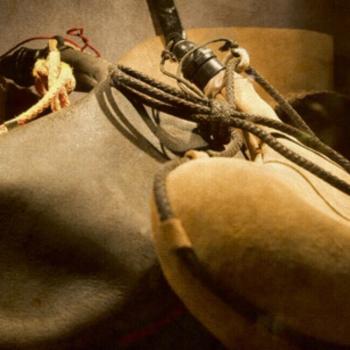[The following is a guest post from Lindsey and Sarah who describe themselves as a celibate LGBT Christian couple. They reached out to me on twitter after my post about the Wheaton dialogue between LGBT-affirming students and Rosaria Butterfield. Lindsey and Sarah are emphatic about saying that they don’t want their story to be used to invalidate any other LGBT story. I asked them to write a guest-post because I was fascinated by their lifestyle, and it was something I hadn’t encountered before. Please ask any genuine, un-snarky questions that you have and/or visit their blog at aqueercalling.com.]
Hello! We’re Lindsey and Sarah, members of a celibate, LGBT, Christian couple who blog regularly at A Queer Calling. We appreciate Morgan giving us an opportunity to share a little of our story with Morgan’s regular readers. We are enthusiastic to be here because we believe there is a multiplicity of LGBT Christian stories, and each story is worthy of being told and heard.
By way of introduction, we’re 29 (Sarah) and 30 (Lindsey) years old and have been enjoying life as a couple for over 16 months. While this may sound like a short period of time, both of us have over a decade of experience in exploring celibate vocations before becoming a couple. The story of celibacy is frequently mischaracterized. We feel that it should be rendered as the stories of celibacies (plural) because every celibate vocation tends to be unique. The life we share together has similarities to and differences from the lives of celibate singles and monastics.
Common images of celibacy include the Roman Catholic priesthood and other kinds of vowed religious life. It’s also reasonably common for people to view a celibate as a hermit who intentionally shuns human contact or as an incredibly socially awkward person who had absolutely no hope of marriage. The idea that God could call us to live our lives as a celibate couple often boggles the minds of many people. And we get that. We totally do. While we are not the only celibate couple we know, we can appreciate that celibate couples are a rare breed. So many of our friends wanted to hear more about our life experience that they encouraged us to share our story. This encouragement from our friends combined with some nudges from the Holy Spirit inspired us to start blogging at A Queer Calling.
Sarah remembers feeling drawn to celibacy for the first time during elementary school, but did not consider the possibility of cultivating a celibate vocation until age 19. Sarah remembers the thought, “I think I might not get married when I grow up” coming to mind for the first time at some point during the fourth grade. During high school, one of Sarah’s most prominent influences was Sarah’s English teacher, Ms. Chafin. Sarah was inspired by the exceptional dedication Ms. Chafin showed her students, and Sarah observed that because Ms. Chafin was not married, there was something different about the way her commitment and compassion for students manifested. Ms. Chafin was also Sarah’s primary influence for choosing a career in education. During Sarah’s time as a young college student, Sarah began to notice the seeds of earlier thoughts on celibacy taking root. After becoming acquainted with a number of religious sisters who found great joy in their celibate vocations, Sarah began a vocational discernment journey that would include many peaks and troughs throughout Sarah’s college and graduate school years. Sarah visited several monasteries and had many illuminating experiences during these times, but slowly came to see that God was not leading Sarah to a monastic vocation. Simultaneously, Sarah was exploring the possibilities of committed relationships with other women. Until the past couple of years, Sarah had struggled with what many gay Christians see as the Church’s “celibacy mandate.” Sarah had previously thought committed partnership and celibacy were mutually exclusive and felt a great deal of pressure to choose one or the other, assuming that no other person would ever consent to living in a celibate partnership. After meeting Lindsey, Sarah immediately felt a greater sense of confidence in where God’s call was leading.
Lindsey began feeling celibacy’s pull at 17. The idea of marriage had lost most of its appeal, especially as Lindsey did not feel inclined towards parenthood. Throughout college, Lindsey considered extensive missionary service. However, many missionary organizations did not seem interested in sending an engineer like Lindsey, which caused that path to feel a bit too much like a force fit. After college, Lindsey searched for a faith community that kept the Gospel at the center of the church’s life and would not require that Lindsey “become straight” before participating in the life of the church. As a result of this search, Lindsey connected with a Christian tradition that celebrated both marriage and monasticism. Several previously disparate parts clicked together in Lindsey’s mind and enabled Lindsey to pray about discerning a celibate vocation. Lindsey spent years visiting different monastic communities and was struck by the diversity present. However, Lindsey did not feel drawn to any particular monastic community. Eventually, Lindsey summoned courage to ask a monastic community for prayers as Lindsey began the discernment process to a celibate way of life. Lindsey approached an abbess in another monastic community who challenged Lindsey to begin practicing a monastic way of life to the degree made possible by God. When Lindsey met Sarah, the door to a celibate vocation grew increasingly wider.
We conceive of celibacy as a vocation. That is to say, we think of celibacy in the same way you might think of marriage and monasticism. Celibacy is a vocation one usually enters into as an adult, is a permanent way of life, and is a path to spiritual maturity. From our vantage point, the vocation of celibacy is not the same thing as a person who commits to sexual abstinence until marriage. We do not, for an instant, conceive of our way of life as the only way to live a celibate vocation. Further, we do not recommend our way of life for all LGBT Christians. As a matter of fact, we are very opposed to forms of spiritual direction that tell LGBT Christians their vocations rather than help LGBT Christians discern their vocational pathways.
First, celibacy is a vocation that a person generally enters into as an adult. God’s call to celibacy can emerge at a young age. It’s not terribly uncommon for a young person to experience inklings that God might be calling him or her to celibacy, but often it takes years of discernment before one can conclude that one is called to celibacy just as it may take years of dating before one commits to choosing one’s spouse. Some people might view celibacy as a sort of default condition: “I was celibate until I got married.” That sort of statement confuses celibate vocations with abstinence. It is true that people are abstinent until their first sexual encounters. However, abstinence does not mean that a person is cultivating a celibate vocation. A person who abstains from sexual intimacy until marriage is most often in the process of discerning a marital vocation. A person becomes celibate in the vocational sense when he or she makes a choice to embrace a lifelong commitment to celibacy. People can make commitments to celibacy when they have some sense or vision for how God wants them to love and serve the world as celibate people. It takes time to attune to how God wants to direct one’s life if one will be living in a celibate vocation. We’d add that it also takes God sending people to confirm that a particular individual is called to a celibate vocation.
Second, celibacy as a vocation is a permanent way of life. In our time together as a couple, we have been amazed at how many people have assumed that God might be calling us to celibacy for a season rather than permanently. We have heard many people say things like, “Maybe you’ll start to see your relationship as a marriage some day,” “You’re so young. When you’re older, you’ll realize that a celibate relationship is impossible,” and “‘Celibacy’ might be a word you need to use for a short period of time before you feel comfortable exploring a fully [sexually] intimate life together.” These attitudes reflect a belief that celibacy can be completely defined as abstention from sexual acts. People often conflate celibacy with abstinence, yet celibacy is a way of life just as marriage is a way of life. Because celibacy is a vocation that a person enters into an as adult, we would encourage churches that offer pre-marriage courses to think about offering pre-celibacy courses as well. If we were designing the syllabus for such a course, we would focus our energies on 4 main topics: 1) radical hospitality, 2) vulnerability, 3) a shared spiritual life, and 4) commitment. Churches do not offer pre-marriage counseling anticipating that the marriage commitment is temporary. As a matter of fact, many churches go to extreme lengths to offer support to married couples. We believe that many Christian traditions have the resources to be able to offer just as much support to those called to celibacy.
Third, celibacy is a path to spiritual maturity. Marriage is not just about two people being together for the rest of their lives and having children; marriage is also concerned with providing both spouses with spiritual growth as they learn to love one another as Christ loves the Church. Similarly, celibacy is a route to holiness as celibate people learn to love and serve the world. We should note that there are many different ways people live in celibate vocations. In our context as a celibate couple, we have so many options about how we use what we have to serve the world. We are constantly discerning how to use our own resources and gifts for this purpose. Part of our life together has involved Lindsey’s supporting Sarah in recovery from an eating disorder. Both Sarah’s lived experience of having an eating disorder and Lindsey’s seeming knack at being supportive have led us to pray about whether God might ask us to support other people in their recoveries. We are prayerfully considering appropriate future steps towards the end goal of opening our home to people who need support with this issue and others. Part of celibacy’s joy is in discerning how God might be calling us to holiness in ways that are both similar to and different from how a married couple might serve the world.
By way of conclusion, we would like to emphasize that we don’t have all the answers. Our journey in celibacy is mysterious, elusive, fantastic, joyous, terrifying, and awesome. We like to think that we have some sense of the important questions, and we benefit immensely from discussing those with others. We have seen ample evidence that God is guiding us towards an abundant life, and we would be grateful for your prayers. We are grateful to Morgan for opening up this space on his blog for us to share a bit more of our story. If you want to see more we’ve written on these ideas, we’d encourage you to check out aqueercalling.com and follow us on Twitter @aqueercalling.










